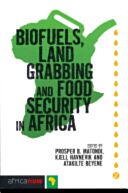Local Storage seems to be disabled in your browser.
For the best experience on our site, be sure to turn on Local Storage in your browser.
Related Products
Check items to add to the cart or
Energy crises and climate change have generated global demands for alternative non-fossil fuel sources. This has led to a rapid increase of investments in production of liquid biofuels based on agricultural feed stocks such as sugar cane. Most African governments see biofuels as a potential for increasing agricultural productivity and export incomes and thus strengthening their national economies, improving energy balances and rural employment. At the same time climate change may be addressed through reduction of green house gas emissions. There are, however, a number of uncertainties mounting that challenge this scenario. Using in-depth African case studies -- with Brazil as a comparative reference -- this book addresses this knowledge gap by examining the impacts of large-scale biofuel production on African agriculture, particularly with regard to vital land outsourcing and food security issues. The surge for African biofuels has also opened space for private investors -- both domestic and external -- to multiply and network "independently" of the state. The biofuel expansion thus generates new economic alliances and production relations, resulting in new forms of inclusions and exclusions within the rural population. This is an essential book for anyone wishing to understand the startling impact of biofuels on Africa.
| Author | Prosper B. Matondi |
|---|
Write Your Own Review
Only registered users can write reviews. Please Sign in or create an account











Sign In
Create New Account